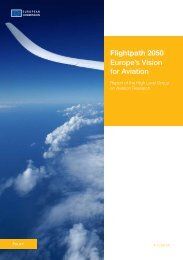Create
Final Report - Acare
Final Report - Acare
- No tags were found...
Create successful ePaper yourself
Turn your PDF publications into a flip-book with our unique Google optimized e-Paper software.
60<br />
Fig.11.<br />
Artist’s impression of loading a multi modal passenger<br />
container directly on a future BWB aircraft<br />
One proposed to keep the passenger with his<br />
or her luggage. The idea is that passengers<br />
would take their own luggage on-board.<br />
Luggage could be stored in separate racks<br />
in the cabin or stored in the passenger seat.<br />
These seats could be used in a multi-modal<br />
way and transferred to other transport modes.<br />
If a number of seats are combined, passengers<br />
could travel in multi-modal pods or containers<br />
that can be loaded onto aircraft, cars and<br />
trains. This would provide connections<br />
between air transport and the multi-modal<br />
surface transport chains that many feel are<br />
needed. Having these pods or seats, the<br />
need to transfer individual passengers and<br />
their luggage could be reduced to the bare<br />
minimum.<br />
Additionally multi-modality could be reached if<br />
the container is compatible with other ground<br />
and water based means of transport. Multimodal<br />
transport, that is using two or more<br />
transport modes for a trip between which<br />
a transfer is necessary, seems an interesting<br />
approach to solving today’s transportation<br />
problems with respect to the deteriorating<br />
accessibility of city centres, recurrent<br />
congestion, and environmental impact.<br />
The opposite concept is to separate the<br />
passenger from his or her luggage completely.<br />
Already in some cities like Vienna the<br />
passenger can check in for his/her flight<br />
down-town and check in the luggage as well.<br />
Check-in is possible well before the flights will<br />
take off. The luggage is then transported to<br />
the airport separately from the passenger and<br />
the passenger will only receive the luggage at<br />
the destination airport.<br />
The Luggage Express set out to provide a<br />
low hassle flight experience for passengers<br />
combined with efficient movement of their<br />
luggage. The principle established is to<br />
allow passengers to check in their luggage<br />
at a large number of convenient centres,<br />
in city areas, at large hotels, rail and bus<br />
stations, even in local stations out of town.<br />
The luggage could be checked in across a<br />
wide time band from very early – perhaps<br />
2 days before flight up until close to flight<br />
departure. The passenger would need to<br />
accept that very late booked in luggage<br />
might suffer a delay compared to earlier<br />
bookings. However, the general experience<br />
would be that luggage would be delivered to<br />
a destination centre. This would depend upon<br />
the nature of the destination. In large city<br />
areas luggage could be delivered to hotels,<br />
bus and train termini, conference centres etc.<br />
In smaller destinations the luggage might<br />
be delivered to a central collecting point in<br />
nearby towns.<br />
The luggage operation would be operated<br />
managerially separately from any passenger<br />
ticket system – although the passenger ticket<br />
might often have valid luggage attachments.



